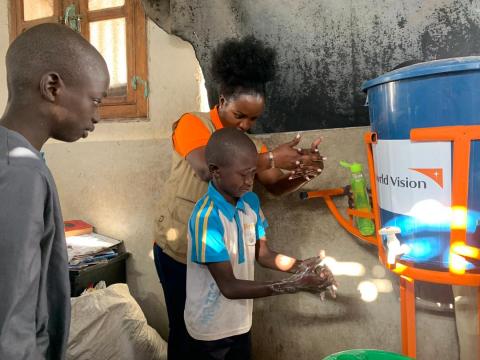Acting together to protect the most vulnerable children and families against COVID-19

From March 2nd to March 31th, Senegal went from one (1) to 175 people who tested positive with the new coronavirus or COVID-19. While cases during the first two weeks of the appearance of the disease in Senegal were limited to the two regions Dakar and Diourbel, cases have now been detected also in the areas of Fatick, Ziguinchor, Saint Louis and Thies. On the 23rd of March, four (4) patients got infected through community transmission meaning that the chain of infection cannot be traced. As such, it is expected that there will be rising numbers of cases and more complex transmission chains, it is to be expected that the number of COVID-19 patients will continue to rise during the coming weeks.
Of the 175 cases, almost 90 cases are in Dakar, the beautiful capital city of Senegal.
Dakar strikes at once by its cosmopolitanism and cultural mix: the variety of its monuments and their strong historical roots: the Dakar Cathedral, also known as the Cathedral of Remembrance, retains its African authenticity through the materials used. Also, Dakar shows new trends: restaurants and lounges by the shore of Atlantic, where you can both enjoy traditional African cuisine and listen to the artists of the moment live.
Alongside its beautiful day and night sceneries, one cannot miss the large number of street children in the city of Dakar; these children (knows as talibes) are said to be in Dakar from rural areas, mostly for koranic studies under the leadership of what are known as Marabou (koranic teachers).
As COVID-19 hits, one cannot help by wonder what happens to these children? Will they know about the epidemic that is tricking down the world? How about the communities in these urban slums?
As part of the implementation of its response against COVID-19 in Senegal, World Vision went down in the outskirt suburban areas of Dakar, in the arrondissement commune of "Parcelles Assainies", which has a population of more than 350,000 inhabitants and houses 137 "daaras", the places where these children stay with their Marabous, to provide support with a batch of materials for the most vulnerable children and families. This donation is comprising hygiene kits, modern handwashing devices, ordinary handwashing devices, gloves, masks, liquid soap, etc.

World Vision has also provided communication supports on the prevention and management methods of the COVID-19, composed of posters, leaflets, Roll-Up in order to strengthen the communication system at the level of health and community structures.
World Vision wants through this support to ensure that the most vulnerable children in this locality on the peripheries of Dakar are protected against COVID-19. As a result, demonstration activities of the mechanism for using the handwashing device were organized with the children themselves but also in the places where they live. Messages to raise awareness and share information on methods of preventing the COVID-19 pandemic were shared with children, religious leaders (imams, priest), the “baajenou goox” (women from the peripheral districts responsible for awareness, home visits), youth and children.
According to Antoinette Habinshuti, National Director of World Vision in Senegal, “World Vision Global Strategy, “Our Promise: Building Brighter Futures for Children” reminded us that the numbers of vulnerable children in urban areas of developing world are increasing. “Parcelles Assainies” is one such peri-urban area in the capital city of Senegal, Dakar, which is very poor and houses a high number of vulnerable children.
The 350,000 people commune hosts 137 "daaras" (local coranique schools that children), would be exposed to COVID-19 virus given its proximity to the city of Dakar, which has many cases to date, including cases of community contamination.
World Vision support to “Parcelles Assainies” in providing hygiene supplies, including handwashing kits, soaps, hand sanitizers, sensitization materials is for the promotion of preventive measures to stop/slow the spread of COVID-19 focusing in households and communities.”

Mr. Amadou Ba, Minister of Foreign Affairs and Senegalese Abroad, a resident of the Commune, welcomed the initiative and reaffirmed his commitment to support the most vulnerable populations, in particular children. He also praised the remarkable work of World Vision through this support which is part of the support for the national response plan against the spread of COVID-19 led by the Ministry of Health and Social Action.
The Parish Priest of the Immaculate Parish of the "Parcelles Assainies", Fr. Marcel Thiaw undertook to continue raising awareness of the prevention and management methods linked to COVID-19. He adds in these terms “we must all follow the recommendations of the Ministry of Health on individual and collective prevention methods in order to win the fight against this pandemic. We also thank World Vision for this timely equipment support which will help us a lot in raising awareness among the faithful, but also in prevention.”
"This donation of equipment is timely because it will better protect these children who are with me, but also my family and the whole community. I will also continue raising awareness with my other Quranic master colleagues so that they do the same" declared Imam Lo, Quranic teacher at Unit 9 of "Parcelles Assainies".

World Vision is fighting COVID-19 in 17 countries to protect the most vulnerable communities by providing health-protection equipment, prevention behavior training, psychosocial support and support for government health authorities.
World Vision Senegal COVID-19 Response Plan was completed with a goal to reach 6,750,734 beneficiaries (1,734,593 men, 1,666,570 women, 1,708,281 boys, and 1,641,290 girls) in order to contribute to the halt and eradicate COVID-19 pandemic in Senegal.